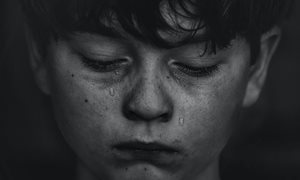
There is a lot to say about our emotional well-being during the COVID-19 pandemic. Anne-Kathrin Brehl, a researcher at Radboudumc, investigated whether anxious people experienced more or less symptoms during the lockdown. What turns out: people who are naturally inclined to withdraw more often were actually less anxious during the pandemic. This is shown in their results, now published in Journal of Affective Disorders Reports.
Anne-Kathrin Brehl, a researcher at the Donders Institute for Brain, Cognition and Behaviour, part of the Radboudumc, completed a study just before the corona pandemic arrived in the Netherlands, involving 250 people who scored high on anxiety scales, but did not yet qualify as having an anxiety disorder.
Brehl was lucky, because she had data that she could easily compare with a study on anxiety during the pandemic. Would the pandemic put these people at increased risk of progressing to an anxiety disorder? Brehl contacted the subjects for a follow-up study, sending participants regular online surveys to ask them about their anxiety, stress and depression levels.
Emotional strategies have predictive powers
The prediction of Brehl and her colleagues was that her subjects would experience even more anxiety symptoms during the pandemic. Remarkably, their anxiety appeared to increase only slightly. In addition, dealing with emotions proved important, says Brehl. "These emotional strategies can predict how people cope with a stressful situation and how much anxiety they experience in the process," Brehl says. "The coping mechanism, how you handle your emotions, is more important than your overall tendency to become anxious as a person."
Those findings teach researchers more about anxiety in the context of the pandemic. "We saw that people who also tended to withdraw before the pandemic experienced less anxiety during the lockdown," says Brehl. "Whereas participants who handled anxiety differently actually became more anxious."
Rethinking coping with emotions
Since the measures against the coronavirus went into effect in March 2020, many more people than usual became self-absorbed. That calls for rethinking ways of dealing with emotions. Everyone has "good" and "bad" coping mechanisms, and while we usually think of withdrawal as a bad, "maladaptive" strategy, you might wonder what's good and bad now that we're all forced home, says Brehl. "People who dealt with their anxiety symptoms by avoiding contact with others suddenly showed a decrease in anxiety thanks to the lockdown. So they actually have an advantage during this pandemic. In this situation, it seems like a plus when you feel less comfortable with social contact."
Dealing with anxiety
Brehl thinks her research contributes to the knowledge of how to deal with emotions during this unprecedented time. At the same time, her research also puts other studies in perspective. "Many corona studies don't have a measurement from before the pandemic, so we have to be careful when interpreting results found."
Apparently, it's not always bad to be anxious, Brehl says. "An anxious person can still function just fine. It's all about your emotional strategy. You don't have to suffer from anxiety, as long as you know how to deal with it."
Publicatie
Maladaptive emotion regulation strategies in a vulnerable population predict increased anxiety during the Covid-19 pandemic: A pseudo-prospective study - Anne-Kathrin Brehl, Aart Schene, Nils Kohn, Guillén Fernández.
Related news items

Playing games to control emotions How cognitively demanding tasks can affect emotion regulation
19 April 2022 Cognitive reappraisal can help us to control our emotions. It involves recognizing negative thought patterns, and gradually changing them to more effective patterns. A new study shows how the cognitive load of reappraisal, rather than the reappraisal itself, affects our emotional processing. go to page
The effects of dopamine levels on reward responsivity
25 November 2021 To adapt to the ever-changing context in which we live, we are constantly deciding how much effort to put into performing our behavior, or how fast to perform our actions. How do people decide how fast to act and how does the brain compute this? Our researchers set out to investigate this. go to page
Adverse effects of Mindfulness-Based Cognitive Therapy in bipolar disorder
18 November 2021 Mindfulness is often described as “being aware of our present moment experience, in a friendly and non-judgmental way”. As research into mindfulness, and psychotherapy in general, has mainly been focused on positive outcomes, not much is known about the possibility of adverse effects. go to page

